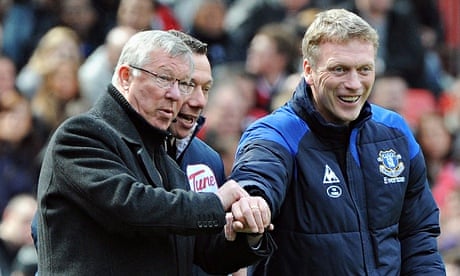
Sir Alex Ferguson has hit back at suggestions that he is partly to blame for Manchester United’s decline, insisting it is absurd to think he left behind an ageing team and an “antiquated” club and distancing himself from the common belief that he was solely responsible for the appointment of David Moyes.
Ferguson described as “nonsense” the suggestion that Moyes had inherited a team in decline and says the problem for the former Everton manager was that he had found it “a massive jump” to move to Old Trafford. “He hadn’t realised just how big United is as a club,” Ferguson writes.
The former United manager offers his first detailed account of the Moyes era in his updated book My Autobiography – officially released on Thursday – and identifies how his successor went against United traditions by adopting a slower playing style that, in his day, would not have been tolerated.
“The reason for playing at speed was that United players had been accustomed to operating that way,” he writes. “If the tempo slowed for any reason, I would be into them at half-time. ‘This is not us,’ I would say. Playing with speed never hindered our results. It was our way: energy and determination in the last third of the pitch.”
Ferguson reveals that he was completely left out of the loop when the decision was made to sack Moyes and, equally, makes it look the same when the club appointed the “formidable” Louis van Gaal. Ferguson’s influence at Old Trafford has clearly waned since the Moyes appointment but, notably, there is no admission on his part that he chose the wrong man, insisting that the club followed a rigorous and methodical selection process.
“There appears to be an accepted view out there that there was no process. Nonsense. We feel we did everything the right way: quietly, thoroughly, professionally.”
Ferguson points out how he tried to talk Moyes into retaining Mike Phelan as assistant manager but the new man chose not to listen and brought in his own backroom staff. “Maybe David felt that at such a massive club he had to be sure that all corners were covered in terms of his support system. I felt that network was already there, with plenty of great people already in important slots.”
Ferguson continues: “As the results deteriorated, each defeat was a hammer blow to him. I could see that in his demeanour. In January we bought Juan Mata and that gave everyone a lift but I could see the walls squeezing in, leaving David with less and less room to breathe. I know that feeling from 1989, when we went through a terrible spell. You feel you are being crushed. The results gnawed away at David. Nobody could dispute how disappointing the season was. And it cost a man his job.”
It led to a meeting between the two men – “just David and me; private” – after United had lost 3-0 at home to Manchester City. Ferguson then recalls how Liverpool “might have battered us” when they won by the same score at Old Trafford. “It’s hard to watch that kind of outcome when Liverpool are the ones dishing out the pain. It was a rough season for a United fan and it was tough for me because I knew there were plenty of good players in our squad. They weren’t showing their form – and that seemed to place a huge weight on David’s shoulders.”
Ferguson insists he kept a “respectful” distance but admits he spoke to Rio Ferdinand and Patrice Evra about their futures. He states, however, that he never entered the dressing room and considered Carrington, United’s training ground, “out of bounds.”
Of the team he left behind, he points out that 11 of the side that won the championship by 11 points were 25 years old or under. “Chelsea started the current season as favourites for the title, with a squad that also had six players in their 30s. I don’t hear any grumbles about the age of their group.”
He attacked the suggestion he had left behind an antiquated system. “Antiquated was a bizarre description of the structure I left behind at Manchester United. Have you seen our new training ground?
”
”
No comments:
Post a Comment